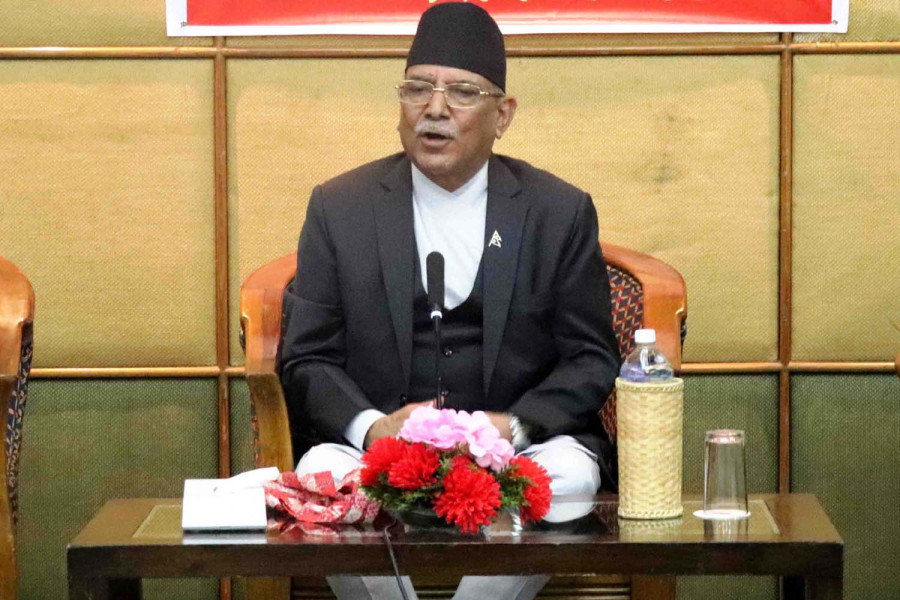Politics
Dahal woos Maoist forces. Is that too little too late?
Maoist Centre is in an existential crisis as its strength in 2022 elections fell sharply compared to the 2017 polls.
Tika R Pradhan
Prime Minister Pushpa Kamal Dahal, who leads the third-largest party in Parliament—CPN (Maoist Centre)—said on Saturday that attempts are on to reunite former Maoist forces.
But party leaders doubt whether Dahal will succeed in regaining the former Maoist party’s lost strength even if he manages to bring all the former Maoists together. Party insiders and observers also reckon that the reunification of Maoists is unlikely anytime soon.
The Maoist Centre is in an existential crisis as the party won significantly fewer seats in the 2022 general elections than in earlier polls. It got just 32 seats (18 from first-past-the-post and 14 under the proportional representation category) while it had won 52 seats (36 FPTP seats and 17 from PR) in 2017.
This time around, the party could secure a distant third position in the House even after forging electoral alliances. Dahal has thus been exploring options to keep his party afloat at a time when newer parties are emerging.
At Dahal’s initiative, a four-party Socialist Front was formed on June 19 with the Upendra Yadav-led Janata Samajbadi Party, Madhav Kumar Nepal-led CPN (Unified Socialist) and Netra Bikram Chand-led Communist Party of Nepal, on board.
The front comes to the fore at a time rumours are swirling that the first (Nepali Congress) and the second (UML) largest parties in Parliament are joining hands to form a stable government.
After the front’s formation, Dahal has strengthened his position with 52 seats, making himself indispensable to both the Congress and the UML in the event of formation of a new government.
Dahal is now trying to bring all former Maoist splinters on one platform, but it’s easier said than done.
As part of his plan, Dahal managed to bring his former comrade Chand’s party into the front, which in turn encouraged him to talk about unity with other Maoist splinters.
But Mohan Baidya, one of his two former deputies, has been berating Dahal for betraying the people and the revolution and has also flatly rejected unity among the former Maoist forces unless Dahal shuns parliamentary politics.
“As far as I know, there is a large chunk of leaders and cadres in the Dharmendra Bastola-led party that merged with Baidya’s party recently, who are lobbying to join hands with the Maoist Centre,” said Lekhnath Neupane, a popular Maoist Centre youth leader. “But I don’t think Baidya will join hands with Dahal.”
According to leaders, after the Maoist Centre, Chand has the strongest organisational base among the former Maoist forces and the leaders who recently joined Baidya’s CPN-Revolutionary Maoists see no future in his party.
Another senior former Maoist leader Baburam Bhattarai’s Nepal Samajbadi Party had to lean on the Maoist Centre to eke out a few seats.
Former prime minister Bhattarai had been the front’s strongest advocate but was left out when the front actually materialised.
“I don’t think Baidya will accept Dahal’s call,” Neupane told the Post. “The problem is that the Maoists cannot regain their lost strength, even if all the former Maoists come together.”
According to Neupane, a vocal critic of his party’s leadership, there must be attempts to bring all left forces together including the CPN-UML, which seems to be a distant dream, at least for now, due to the ego tussles among the top Maoist Centre and UML leaders.
“With Biplav and Bhattarai on board, Dahal can show that the major Maoist splinter forces are now with him,” said Jhalak Subedi, an analyst who closely follows left politics.
“Even if Dahal somehow unites all the Maoist forces, he will still have a tough time addressing the concerns of the youths who are becoming a decisive electoral force.”
Some senior Maoist leaders including Ram Bahadur Thapa, Top Bahadur Rayamajhi, Mani Thapa and Lekhraj Bhatta abandoned the party to join the UML after the dissolution of the Nepal Communist Party formed through a merger of the country’s two biggest communist parties.
With the splinter of the Chand-led party—CPN (Bahumat)—merging with Baidya’s CPN-Revolutionary Maoists, the organisational strength of Chand’s party has significantly decreased.
Bishwo Bhakta Dulal, better known as Aahuti, has been leading Baigyanik Samajbadi Party while another former Maoist leader Gopal Kirati is leading another fringe Maoist party. Both the former Maoist leaders have lashed out at the Dahal-led Maoist Centre and they are currently not in a position to join hands with Dahal.
On January 7, the Maoist Centre formed a five-member talks team led by Vice-chairman Krishna Bahadur Mahara and entrusted the team with exploring the possibility of a left unity. The panel includes the party’s general secretary Dev Gurung and deputy general secretaries Girirajmani Pokhrel, Shakti Basnet and Janardan Sharma as members.




 8.79°C Kathmandu
8.79°C Kathmandu














